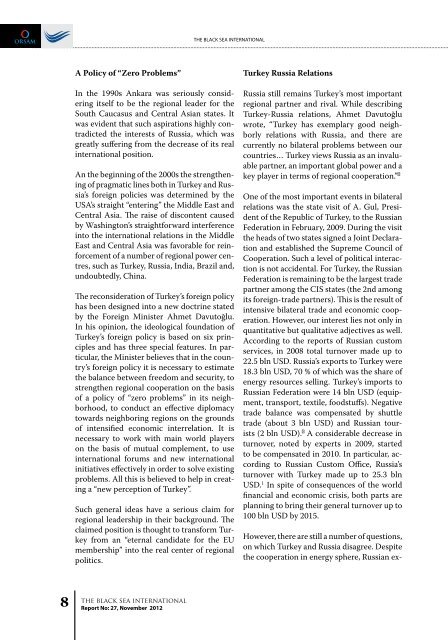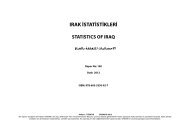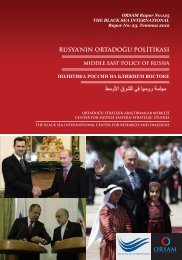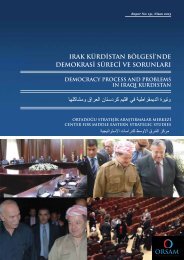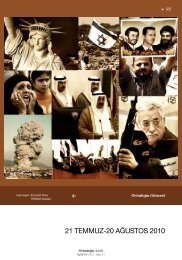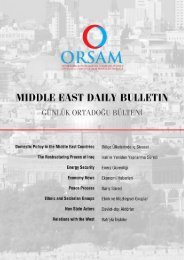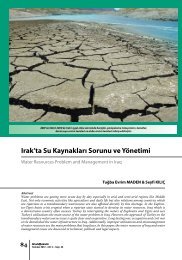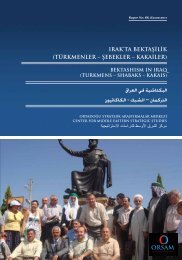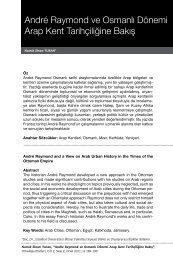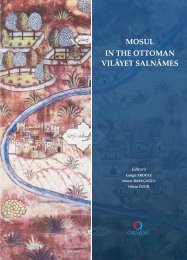türkiye'nin eski sovyet cumhuriyetleriyle münasebetlerinin ... - orsam
türkiye'nin eski sovyet cumhuriyetleriyle münasebetlerinin ... - orsam
türkiye'nin eski sovyet cumhuriyetleriyle münasebetlerinin ... - orsam
You also want an ePaper? Increase the reach of your titles
YUMPU automatically turns print PDFs into web optimized ePapers that Google loves.
ORSAM<br />
THE BLACK SEA INTERNATIONAL<br />
A Policy of “Zero Problems”<br />
In the 1990s Ankara was seriously considering<br />
itself to be the regional leader for the<br />
South Caucasus and Central Asian states. It<br />
was evident that such aspirations highly contradicted<br />
the interests of Russia, which was<br />
greatly suffering from the decrease of its real<br />
international position.<br />
An the beginning of the 2000s the strengthening<br />
of pragmatic lines both in Turkey and Russia’s<br />
foreign policies was determined by the<br />
USA’s straight “entering” the Middle East and<br />
Central Asia. The raise of discontent caused<br />
by Washington’s straightforward interference<br />
into the international relations in the Middle<br />
East and Central Asia was favorable for reinforcement<br />
of a number of regional power centres,<br />
such as Turkey, Russia, India, Brazil and,<br />
undoubtedly, China.<br />
The reconsideration of Turkey’s foreign policy<br />
has been designed into a new doctrine stated<br />
by the Foreign Minister Ahmet Davutoğlu.<br />
In his opinion, the ideological foundation of<br />
Turkey’s foreign policy is based on six principles<br />
and has three special features. In particular,<br />
the Minister believes that in the country’s<br />
foreign policy it is necessary to estimate<br />
the balance between freedom and security, to<br />
strengthen regional cooperation on the basis<br />
of a policy of “zero problems” in its neighborhood,<br />
to conduct an effective diplomacy<br />
towards neighboring regions on the grounds<br />
of intensified economic interrelation. It is<br />
necessary to work with main world players<br />
on the basis of mutual complement, to use<br />
international forums and new international<br />
initiatives effectively in order to solve existing<br />
problems. All this is believed to help in creating<br />
a “new perception of Turkey”.<br />
Such general ideas have a serious claim for<br />
regional leadership in their background. The<br />
claimed position is thought to transform Turkey<br />
from an “eternal candidate for the EU<br />
membership” into the real center of regional<br />
politics.<br />
Turkey Russia Relations<br />
Russia still remains Turkey’s most important<br />
regional partner and rival. While describing<br />
Turkey-Russia relations, Ahmet Davutoğlu<br />
wrote, “Turkey has exemplary good neighborly<br />
relations with Russia, and there are<br />
currently no bilateral problems between our<br />
countries… Turkey views Russia as an invaluable<br />
partner, an important global power and a<br />
key player in terms of regional cooperation.” <br />
One of the most important events in bilateral<br />
relations was the state visit of A. Gul, President<br />
of the Republic of Turkey, to the Russian<br />
Federation in February, 2009. During the visit<br />
the heads of two states signed a Joint Declaration<br />
and established the Supreme Council of<br />
Cooperation. Such a level of political interaction<br />
is not accidental. For Turkey, the Russian<br />
Federation is remaining to be the largest trade<br />
partner among the CIS states (the 2nd among<br />
its foreign-trade partners). This is the result of<br />
intensive bilateral trade and economic cooperation.<br />
However, our interest lies not only in<br />
quantitative but qualitative adjectives as well.<br />
According to the reports of Russian custom<br />
services, in 2008 total turnover made up to<br />
22.5 bln USD. Russia’s exports to Turkey were<br />
18.3 bln USD, 70 % of which was the share of<br />
energy resources selling. Turkey’s imports to<br />
Russian Federation were 14 bln USD (equipment,<br />
transport, textile, foodstuffs). Negative<br />
trade balance was compensated by shuttle<br />
trade (about 3 bln USD) and Russian tourists<br />
(2 bln USD). A considerable decrease in<br />
turnover, noted by experts in 2009, started<br />
to be compensated in 2010. In particular, according<br />
to Russian Custom Office, Russia’s<br />
turnover with Turkey made up to 25.3 bln<br />
USD. 1 In spite of consequences of the world<br />
financial and economic crisis, both parts are<br />
planning to bring their general turnover up to<br />
100 bln USD by 2015.<br />
However, there are still a number of questions,<br />
on which Turkey and Russia disagree. Despite<br />
the cooperation in energy sphere, Russian ex-<br />
8<br />
the black sea ınternatıonal<br />
Report No: 27, November 2012


